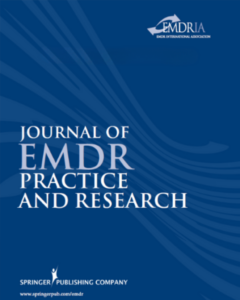The EMDR Protocol for Recent Critical Incidents: Follow-Up Report of an Application in a Human Massacre Situation (Journal of EMDR Practice and Research)
Follow-up results of study investigating application of EMDR Protocol for Recent Critical Incidents (EMDR-PRECI) in human massacre situation.
Read MoreComparison of Eye Movement Desensitization and Reprocessing and Biofeedback/Stress Inoculation Training in Treating Test Anxiety (Journal of EMDR Practice and Research)
EMDR & Biofeedback/Stress Inoculation Training (B/SIT) treatment was compared with no treatment in reducing test anxiety in college students.
Read MoreDesensitization of Triggers and Urge Reprocessing for an Adolescent With Internet Addiction Disorder (Journal of EMDR Practice and Research)
Treatment of Internet addiction in 13-year-old male using desensitization of triggers & urge reprocessing (DeTUR) addiction protocol of EMDR.
Read MoreLetter: Comment on Dunne and Farrell (2011) (Journal of EMDR Practice and Research)
Response from survey author on new research using data on clinician experience incorporating EMDR into their practice.
Read MoreTones inferior to eye movements in the EMDR treatment of PTSD (Behaviour Research and Therapy)
Study suggests that eye movements outperformed tones while it remained unclear if tones add to recall only.
Read MoreThe effectiveness of eye movement desensitization and reprocessing therapy on the emotion regulation and emotion recognition of addicted individuals (Zahedan Journal of Research in Medical Sciences)
Assessing the effectiveness of EMDR therapy on the emotion regulation and emotion recognition of addicts with traumatic experience.
Read MoreAvoidant coping and treatment outcome in rape-related posttraumatic stress disorder (Journal of Consulting and Clinical Psychology)
This study investigated the impact of avoidant coping on treatment outcome in rape-related posttraumatic stress disorder (PTSD).
Read MoreTrauma, psychosis, post-traumatic stress disorder and the application of EMDR (Rivista De Psichiatria)
In this article we describe three interactions between trauma, post-traumatic stress disorder (PTSD) and psychosis
Read MoreStudio di valutazione dell’efficacia clinica e neurobiologica dell’EMDR in pazienti affetti da disturbo da stress post-traumatico (Rivista Di Psichiatria)
Il nostro studio suggerisce che il trattamento con EMDR è associato a un significativo miglioramento dei sintomi di PTSD e a un parallelo incremento dei volumi ippocampali.
Read MoreTime-course of eye movement-related decrease in vividness and emotionality of unpleasant autobiographical memories (Memory)
Participants retrieved unpleasant memories & rated their vividness/emotionality prior to & following eye movements or keeping eyes stationary.
Read MoreEMDR e terapia psicofarmacologica nel trattamento del disturbo da stress post-traumatico (Rivista Di Psichiatria)
Questo studio si propone di valutare l’efficacia di due diversi trattamenti nella cura del disturbo da stress post-traumatico (PTSD): la terapia psicofarmacologica, attraverso l’utilizzo di serotoninergici, e l’EMDR
Read MoreEMDR e terapia cognitivo-comportamentale nel trattamento del disturbo di panico: un confronto (Rivista Di Psichiatria)
Confrontare due trattamenti utilizzati nel disturbo di panico: EMDR, metodo evidence-based di provata efficacia nel disturbo da stress post-traumatico, e la terapia cognitivo-comportamentale (CBT).
Read More


